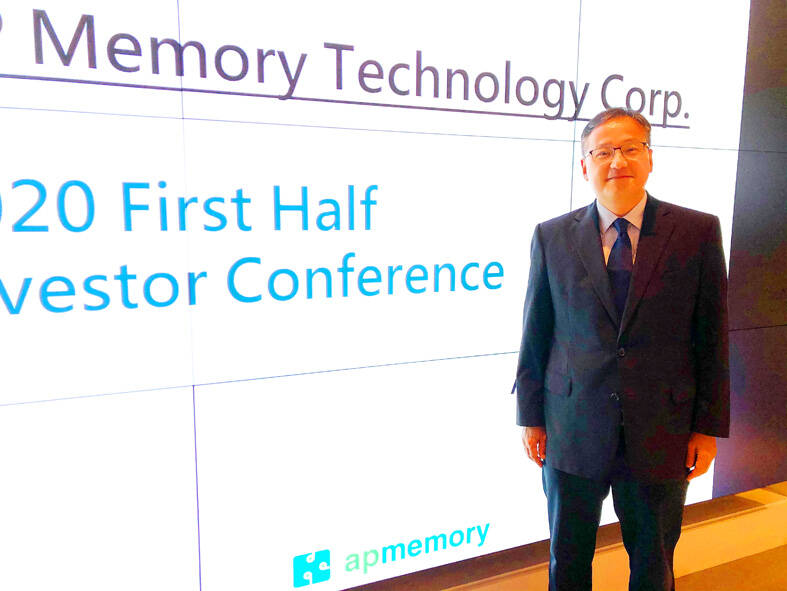Memorychip supplier AP Memory Technology Corp (愛普科技) yesterday said it expects to see the first revenue contribution from licensing its intellectual property (IP) linked to advanced packaging technologies used in artificial-intelligence (AI) accelerator chips in the next year.
That would be major progress in its strategy of shifting its focus to supplying very-high-bandwidth memory (VHM) chips used in mainstream AI applications from chips for crypto mining.
Licensing IP used in AI chips appears to be the first step. AP Memory said it is in discussion with several customers to grant its IP to develop silicon interposer, a key part of the advanced packaging technology for AI chips.

Photo courtesy of AP Memory Technology Corp
The company yesterday declined to identify Samsung Electronics Co as one of the potential customers who has adopted or intend to adopt its technology.
“We cannot comment on specific customers,” AP Memory vice president Liu Chin-hung (劉景宏) told investors. “We are in talks with more than one customer to license our IP and provide other services as well. We expect to see revenue contribution within a year at the earliest.”
“We have received a license fee from some customers,” Liu said.
AP Memory shares closed at NT$348 on Wednesday, up from NT$174 at the beginning of this year. Investors consider AP Memory one of the beneficiaries of the AI boom.
Apart from IP licensing, AP Memory also aims to offer its VHM technology for AI chips, replacing the mainstay high-bandwidth memory (HBM) developed by the world’s top three memorychip makers — Samsung, Micron Technology Inc and SK Hynix Inc.
Some AI accelerator chip suppliers have approached AP Memory seeking potential supply of VHM chips as supplies of HBM chips are scarce, Liu said.
Spiking demand for AI algorithms, a large-language-model to generate data and text, has boosted demand for HBM chips, Liu said.
Some projects have entered the proof-of-concept phase, the first of six or more phases of development before a product enters mass production, Liu said.
It would take one to three years for one such project to yield results, AP Memory chairman and chief executive officer Chen Wen-liang (陳文良) said.
As a result, the company’s AI business group would be in the trough in next two quarters in terms of revenue, Chen said.
Falling demand for older-generation chips used in crypto mining is also a factor, he said.
New-generation chips are to enter production next year, he said.
The company’s AI business group accounted for 10 percent of its total revenue last quarter, with 90 percent from supplying memory chips used in Internet-of-Things devices.
AP Memory’s net profit in the second quarter soared 277 percent to NT$389.74 million (US$12.32 million) from NT$101.04 million in the first quarter. On an annual basis, net profit contracted 17 percent from NT$456.57 million.
Earnings per share rose to NT$2.35 from NT$0.62 the previous quarter. That represented a decline from NT$2.83 a year earlier.
The company expects revenue to grow in the second half of the year thanks to inventory replenishment demand from customers.
For the full year, the company expects revenue to be flat or grow slightly from NT$5.1 billion last year.

JITTERS: Nexperia has a 20 percent market share for chips powering simpler features such as window controls, and changing supply chains could take years European carmakers are looking into ways to scratch components made with parts from China, spooked by deepening geopolitical spats playing out through chipmaker Nexperia BV and Beijing’s export controls on rare earths. To protect operations from trade ructions, several automakers are pushing major suppliers to find permanent alternatives to Chinese semiconductors, people familiar with the matter said. The industry is considering broader changes to its supply chain to adapt to shifting geopolitics, Europe’s main suppliers lobby CLEPA head Matthias Zink said. “We had some indications already — questions like: ‘How can you supply me without this dependency on China?’” Zink, who also

Taiwan Semiconductor Manufacturing Co (TSMC, 台積電) received about NT$147 billion (US$4.71 billion) in subsidies from the US, Japanese, German and Chinese governments over the past two years for its global expansion. Financial data compiled by the world’s largest contract chipmaker showed the company secured NT$4.77 billion in subsidies from the governments in the third quarter, bringing the total for the first three quarters of the year to about NT$71.9 billion. Along with the NT$75.16 billion in financial aid TSMC received last year, the chipmaker obtained NT$147 billion in subsidies in almost two years, the data showed. The subsidies received by its subsidiaries —

At least US$50 million for the freedom of an Emirati sheikh: That is the king’s ransom paid two weeks ago to militants linked to al-Qaeda who are pushing to topple the Malian government and impose Islamic law. Alongside a crippling fuel blockade, the Group for the Support of Islam and Muslims (JNIM) has made kidnapping wealthy foreigners for a ransom a pillar of its strategy of “economic jihad.” Its goal: Oust the junta, which has struggled to contain Mali’s decade-long insurgency since taking power following back-to-back coups in 2020 and 2021, by scaring away investors and paralyzing the west African country’s economy.

RE100 INITIATIVE: Exporters need sufficient supplies of renewable energy to meet their global commitments and remain competitive, the economics ministry said Local export-oriented manufacturers, including Taiwan Semiconductor Manufacturing Co (台積電), require sufficient supplies of green energy to maintain their competitiveness and regulations already ensure that renewable energy development adheres to environmental protection principles, the Ministry of Economic Affairs said yesterday, as the legislature imposed further restrictions on solar panel installations. The opposition-led Legislative Yuan yesterday passed third readings to proposed amendments to three acts — the Environmental Impact Assessment Act (環境影響評估法), the Act for the Development of Tourism (發展觀光條例) and the Geology Act (地質法) — which would largely prohibit the construction of solar panels in some areas. The amendments stipulate that ground-mounted solar